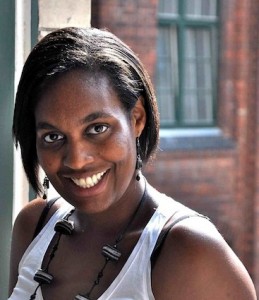
ECLA of Bard routinely hosts illustrious academic speakers to supplement the Value Studies curriculum, but a few times per semester the administration sponsors a different kind of event: the career evening. Successful representatives from various disciplines and industries in Berlin or from even farther afield come to Pankow and sit interview-style at the front of our lecture hall. They give brief summaries of their careers and the academic paths which led to them. Then they answer our questions, either fueling or soothing our future hopes and fears––both equally healthy and necessary steps in the collegiate process of self-construction. These exchanges give us an idea of what and how we can plan on putting our ECLA-enhanced critical and constructive skill sets to use once we graduate. This time around, the careers evening centered on working in culture and the arts.
Two very inspiring Berlin-based creative minds were on hand to represent entrepreneurial success and to answer our questions: Sharmaine Lovegrove, a publishing specialist and the founder of Dialogue Books, Berlin’s premiere English-language bookshop and writing resource center; and interdisciplinary creative Nele Heinevetter from Niche, a custom art and architectural tour provider which she co-founded. Agata Lisak––(http://www.ecla.de/people/faculty-and-instructional-staff/agata-lisiak/), a Media and Communication Studies specialist as well as ECLA’s internship course coordinator, deftly moderated the Q&A, which began by briefly introducing the guests and the businesses that they both founded or co-founded, and then led into a lively volley of Q&As concerning precisely how it was that their paths led them to realize these ventures.

Sharmaine Lovegrove, a third-generation Londoner, obtained degrees in Political Science and Anthropology from the University College of London, as well as an MA in Political Economy. In London she worked as a runner, an assistant, a publicist, and a reader in the publishing industry for about a decade, all the while enjoying Easyjet forays to European capitals with her friends. Ostensibly for weekend sightseeing, these trips (according to Lovegrove) actually permitted her the opportunity to suss out the status and network of independent booksellers around Europe. Since the 1997 collapse of the UK’s Net Book Agreement––which had ensured a minimum sales price for books––the future of traditional bookstores and independent booksellers had begun to look shaky. The impending shift meant that discount stores and high-volume booksellers like Amazon would more easily dominate the market with cheaply priced books, edging out independent booksellers.
In continental Europe, however, retail provisions still protected the prices of books and in turn independent booksellers. Having noticed that though Berlin was an important cultural capital, as well as a growing hub for international collaboration and intellectual creativity, yet had no specialized English-language bookstore, Lovegrove plotted, saved, moved to Berlin and opened her own. Dialogue Books was the resulting venture, and has been serving Berlin with hand-selected English language literature and creative writing support since 2009. Part of Lovegrove’s motivation for opening her own bookstore was the (not hard to agree with) conviction that a very knowledgeable staff in a small, friendly bookstore are more equipped to help customers develop and pursue a personal intellectual journey through books than big, impersonal websites or retailers are.
In the years since 2009, booksellers in Europe have also been affected by changes similar to the UK’s in publishing and book retail policy. After a period of perseverance, Lovegrove made the decision this spring to close the physical storefront of Dialogue Books and move to a different configuration. The bookstore is still a mainstay of the English-language literary community, but now exists online along with a coterie of reader resources including a blog, book clubs, author readings around Berlin, and the “book doctor” service, which matches readers to books via a series of pertinent questions and a personal interview, likely to be held over a glass of wine.

Nele Heinevetter also found her niche (or niches) in Berlin and turned it into a venture. She is a co-founder of Niche, a tour service founded while she was still a Masters student in Art History. The three founders of Niche have academic backgrounds in history, art, media, cultural sciences, and architecture. Heinevetter had studied at the Bauhaus University in Weimar and then published a book on media culture before moving to Berlin for graduate school. The other two co-founders were also interdisciplinary in interests and backgrounds, so it was the confluence of these advanced cultural studies set in the dynamic atmosphere of Berlin that led them to develop Niche. While working on a paper addressing Berlin’s numerous pop-ups, hidden creative locations, and non-commercial project spaces, the idea of offering tours to help others access these niches of the Berlin creative scenes led to a business plan competition, which generated funding and the first wave of tours and business-building.
Niche has now been featured in numerous travel and culture magazines, though most tours are still booked through references. As Heinevetter stated in an interview, “It was always word of mouth; we never paid anything for advertisements really. I guess not everyone understands what we are doing, so it’s important that people talk about us to others.”
One thing common to Lovegrove and Heinevetter was the fact that both first pursued an education in topics of art, culture, and politics interesting to them – and only then happened to find or build the situation in which to apply these bodies of knowledge they had accumulated. Lovegrove said that even while she studied politics, she was always a reader and always interested in the trajectories of books en masse – so much so that she knew she might end up working with publishing anyway. So it wasn’t that she had gotten an education in politics and then decided that it wasn’t fitting for what she wanted to do, or that her education didn’t offer her the prospects she had anticipated. It was that she had simply identified politics as that specialization which she most wanted to inform the work she would go on to do.
The same goes for Heinevetter: her varied and interdisciplinary background from media to art history and contemporary urban studies provided a very large sphere of familiarity with socio-physical topics, within which she was able to create a venture that fits her interests. Along with the other founders of Niche, she continues to work on her own projects (curation of project spaces, for example) while running the tours and logistics concurrently. Heinevetter also made sure to mention that if it’s your own project you’re pursuing, it’s a labor of love and perseverance: “It is very important to really love what you do. It kept us going in the beginning. You will not see a lot of money right away, so you have to love it. Learning by doing is also important. Also don’t be afraid to not have the answers because you can’t possibly know everything.”
It would have been lovely to file into the careers evening and receive the good news that there are legions of jobs just waiting for us to waltz into after we complete this chapter of our most universally flexible and valuable educations. However, I don’t think that’s what we expected. I read somewhere recently that 40% of us will end up in jobs, whose titles don’t exist yet, and this double––sided coin of flexibility and insecurity is something we can see in our futures. What we learned from Sharmaine and Nele (with whom we were on a first-name basis by the end of the evening) was that in the arts and culture – perhaps as in any domain these days––one must be proactive, creative, collaborative, and maybe even daring.
Heinevetter quotes from:
http://blog.gidsy.com/post/8086078368/interview-with-niche-berlin
